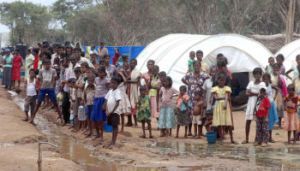
Publisher:
Bonnie King
CONTACT:
Newsroom@Salem-news.com
Advertising:
Adsales@Salem-news.com

~Truth~
~Justice~
~Peace~
TJP
Sri Lanka's No-Win Situation Part 2
INTERNALLY DISPLACED PERSONS and the temporary structures that accommodate them in the Arunachalam camp at Manik Farm in northern Sri Lanka, an August 2009 photograph. The LLRC suggests ways to tackle the issues of resettlement and genuine reconciliation, including completion of the process of the return of the refugees to their homes and restoration of normal life in the war-affected areas. While the commission has detailed various acts of violence and killings by the Liberation Tigers of Tamil Eelam (LTTE) in graphic detail, it has claimed that it was faced with “difficulties in attempting a reconstruction of certain incidents involving the loss of civilian lives which have been brought to the attention of the commission”. The report says: “While the commission finds it difficult to determine the precise circumstances under which such incidents occurred… the material nevertheless points towards possible implication of the security forces for the resulting death or injury to civilians, even though this may not have been with an intent to cause harm. In these circumstances the commission stresses that there is a duty on the part of the state to ascertain more fully the circumstances under which such incidents could have occurred and, if such investigations disclose wrongful conduct, to prosecute and punish the wrongdoers.” On the question of forced disappearances, the report says: “It is the clear duty of the state to cause necessary investigations into such specific allegations and, where such investigations produce evidence of any unlawful act on the part of individual members of the Army, to prosecute and punish the wrongdoers. The commission must also stress in this regard that if a case is established of a disappearance after surrender to official custody, this would constitute an offence entailing penal consequences. Thus the launching of a full investigation into these incidents and, where necessary, instituting prosecutions is an imperative also to clear the good name of the Army who have by and large conducted themselves in an exemplary manner in the surrender process and when civilians were crossing over to cleared areas, which conduct should not be tarnished by the actions of a few.” In the chapter “Overview of Security Forces Operations”, the LLRC deals with in detail the larger picture of the operations and, in effect, exonerates the Army of any large-scale wrongdoing. Regarding the sensitive question of what language to sing the national anthem in, it stops short of making a specific recommendation and lists two views – to add two lines in Tamil or allow the anthem to be sung in Tamil as was the case earlier. It also wants the government to look into discrimination in education in order to bring about genuine reconciliation. The LLRC also suggests ways to tackle the vexatious issues of resettlement and genuine reconciliation, including completion of the process of the return of IDPs and refugees to their respective homes and restoration of normal civilian life in affected areas. The commission is of the view that “consideration should also be given to providing appropriate redress to the next of kin of those killed and those injured as a humanitarian gesture that would help the victims to come to terms with personal tragedy, both in relation to the incidents referred to above and any other incidents which further investigations may reveal.” The LLRC's terms of reference did not allow it to investigate war crimes. The committee came in for criticism from international human rights groups for this. India's stand Making “initial comments” on the LLRC report 11 days after the report was tabled in the Sri Lankan Parliament, Vishnu Prakash, spokesperson for the Indian Ministry of External Affairs, said that India wanted an “independent and credible mechanism… to investigate allegations of human rights violations” during the end stages of Eelam War IV. This needs to be done in a “time-bound manner”, he said. Page 1 Page 2 |       | |
Contact: adsales@salem-news.com | Copyright © 2025 Salem-News.com | news tips & press releases: newsroom@salem-news.com.
Terms of Service | Privacy Policy | ||

All comments and messages are approved by people and self promotional links or unacceptable comments are denied.
[Return to Top]
©2025 Salem-News.com. All opinions expressed in this article are those of the author and do not necessarily reflect those of Salem-News.com.